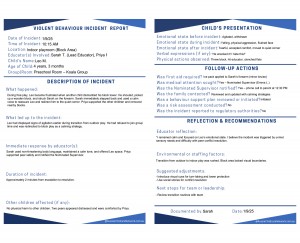Early childhood is a time of testing all sorts of boundaries. As young children gain more control over their bodies, they become keener to explore physical and social environments, trying to understand what they can and cannot do. In this process of exploration, children end up behaving in ways which can be harmful to themselves, others and the environment in general.
The following are behavioural intervention strategies you can practise with young children when they engage in the following negative or disruptive behaviours.
Non-compliance
When the child refuses to do an activity or wants to do something else, maintain consistent demand. Let them know that they must complete the first task or direction asked before moving on. A more effective intervention in the long run is the token economy system. If possible, ignore non-compliance of the child but as soon as the child does what they are supposed to do, extend positive reinforcement with loud praise or enthusiastic attention.
Physical Aggression
If a child is behaving aggressively or lashing out with their limbs, try replacement techniques like giving them a fidget toy or stress ball. This will provide them with a safe outlet to express anger, frustration or even excess energy. As and when the child calms down and behaves reasonably, offer positive reinforcement with attention and praise. In case the child is behaving in a way that can hurt others, physically remove them from the situation to a designated space to give the child an opportunity to calm down physically and emotionally. Such a space can be a tent equipped with heavy blanket or even a corner in the classroom that has a bean bag.
Tantrums
Recognise that children need to express strong feelings but help them find safe ways to do this like through drawing or writing about their feelings. As soon as they lower their voice or stop acting out, reinforce the positive behaviour with attention or praise. In case they are acting out physically as well, they may need to be removed to a safe space for a time out. All the while, use kind words and a soothing voice with the child. Raising your own voice or showing frustration will only raise anxiety levels still further.
Destruction of Property
If a child is throwing around objects, loss of privilege can be used by taking away the toy or object. In case they have destroyed something that can be fixed like a tower made with blocks, give them an opportunity to do so. If the destructive tendencies arise out of rage or frustration, help them learn calming strategies like deep breathing or counting. Remember to offer positive reinforcement when they stop throwing around objects, have fixed something that they broke or even calmed down on their own.
Off Task
A day crammed with activities can become exhausting for children, making some avoid activities or even escape from the learning setting. See if you can chunk tasks or alternate high energy activities with low-energy ones. Offer prompt attention or praise when a child starts doing the task and follow it through. Ensure that children have access to adequate breaks throughout the day. Also providing visual cues like break cards may offer respite to students who find the steady stream of instructions dispiriting.
The techniques we use when dealing with children's behaviour are obviously going to be different than those used by parents. Our aim is to provide the children with a positive atmosphere and establishing opportunities for recognizing and reinforcing appropriate behaviour.
Behaviour Management In Childcare
Children who display challenging behaviour don’t usually do so ‘just because they want to’. There’s often a reason behind their behaviour or it might be their only way of telling you something’s wrong. All behaviour is a form of communication. Therefore, it’s essential that you understand the causes of challenging behaviour.
Supporting Children With Challenging Behaviours
There are different types of behaviour that children can display and sometimes it can be hard to manage, especially if a child is having behavioural issues. This article will help you to develop a behaviour management plan which can be used during the hard times.
Behaviour Management Plans In Early Childhood
It's important to remember that each and every child is different and this is your chance to guide each child's behaviour in an appropriate manner while maintaining each child's self esteem and opportunities to grow and develop.







 As an Educator in Australia, your pay rate falls under the Children’s Services Award 2010. This award states the minimum amount that an employer can
As an Educator in Australia, your pay rate falls under the Children’s Services Award 2010. This award states the minimum amount that an employer can When working as a qualified Early Childhood Teacher (with a university degree) within a service, your rate of pay will come from the Educational Services
When working as a qualified Early Childhood Teacher (with a university degree) within a service, your rate of pay will come from the Educational Services When working as a Diploma Qualified Educator your pay rate is from the Children's Services Award 2010. This Award states your minimum rate of pay
When working as a Diploma Qualified Educator your pay rate is from the Children's Services Award 2010. This Award states your minimum rate of pay When working as a Cert 3 Qualified Educator, your pay rate is from the Children's Services Award 2010. This Award states your minimum rate of
When working as a Cert 3 Qualified Educator, your pay rate is from the Children's Services Award 2010. This Award states your minimum rate of Educational Leaders play a crucial role in their early childhood service by ensuring that the educational program aligns with best practices and supports the holistic
Educational Leaders play a crucial role in their early childhood service by ensuring that the educational program aligns with best practices and supports the holistic In early childhood education and care, ratios are more than a technicality—they are a frontline safeguard. Every child deserves responsive supervision, emotional connection, and developmental
In early childhood education and care, ratios are more than a technicality—they are a frontline safeguard. Every child deserves responsive supervision, emotional connection, and developmental With the new national child safety reforms kicking in on 1 September 2025, early childhood services like yours have a real opportunity to lead the
With the new national child safety reforms kicking in on 1 September 2025, early childhood services like yours have a real opportunity to lead the Here’s a comprehensive Mobile Phone and Smart Watch Policy tailored for early childhood education and care (ECEC) services in Australia, aligned with the latest 2025
Here’s a comprehensive Mobile Phone and Smart Watch Policy tailored for early childhood education and care (ECEC) services in Australia, aligned with the latest 2025 The Sea of Fish Challenge is a national initiative that invites children, educators, families, and communities to create and display fish artworks as a symbol
The Sea of Fish Challenge is a national initiative that invites children, educators, families, and communities to create and display fish artworks as a symbol Across the early childhood education and care sector, educators are sounding the alarm: current staffing ratios are insufficient to deliver safe, meaningful, and developmentally appropriate
Across the early childhood education and care sector, educators are sounding the alarm: current staffing ratios are insufficient to deliver safe, meaningful, and developmentally appropriate


